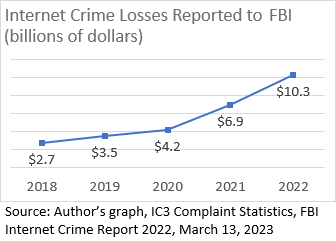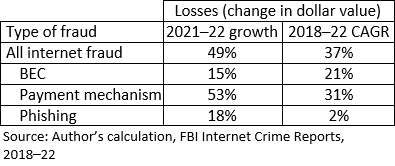The Federal Bureau of Investigation (FBI) has reported a staggering increase in the dollar value of losses due to internet crime for 2022 . Losses from investments fraud, phishing, business email compromise (BEC), data breaches, malware, spoofing, identity theft, tech support scams, and the like increased to $10.3 billion from $6.9 billion in 2021, or 49 percent. The chart below shows the steep trajectory of losses beginning with 2021.

The FBI report identifies 27 types of internet fraud. Let's focus on three crimes of concern for financial institutions. Losses for all three—BEC, payment mechanism fraud, and phishing—increased from 2021. In 2022, these three types accounted for 28 percent of all internet fraud losses, with BEC responsible for the largest share, 25 percent.
The report uses the term "credit card/check fraud" to encompass "theft and fraud committed using a credit card or any similar payment mechanism (ACH, EFT, recurring charge, and more) as a fraudulent source of funds in a transaction." To clarify the broad scope of this category, I'm using the FBI's term from its definition, "payment mechanism," in this post.
Looking back at the past five years of FBI reports in the table below, you can see the growth trajectories for losses due to these crimes. Payment mechanism crime, while small in total dollar value, grew significantly over the years.

Looking at impact by incidence, phishing is by far the most prevalent type of internet fraud: more than 300,000 complaints submitted to the FBI in 2022 and five times more reported than the next type of internet fraud (personal data breach). Despite its low total dollar value, payment mechanism crime also is in the top 10 by number of complaints. These crimes mostly affect consumers, with lower average dollar values of losses: approximately $173 per incident for phishing and $11,500 for payment mechanism crime, compared to $126,000 for BEC, which of course affects business entities.
As I hope you can tell from this post, the FBI's annual report provides a wealth of information for everyone interested in preventing, detecting, and stopping fraud. I hope you'll take a look.



